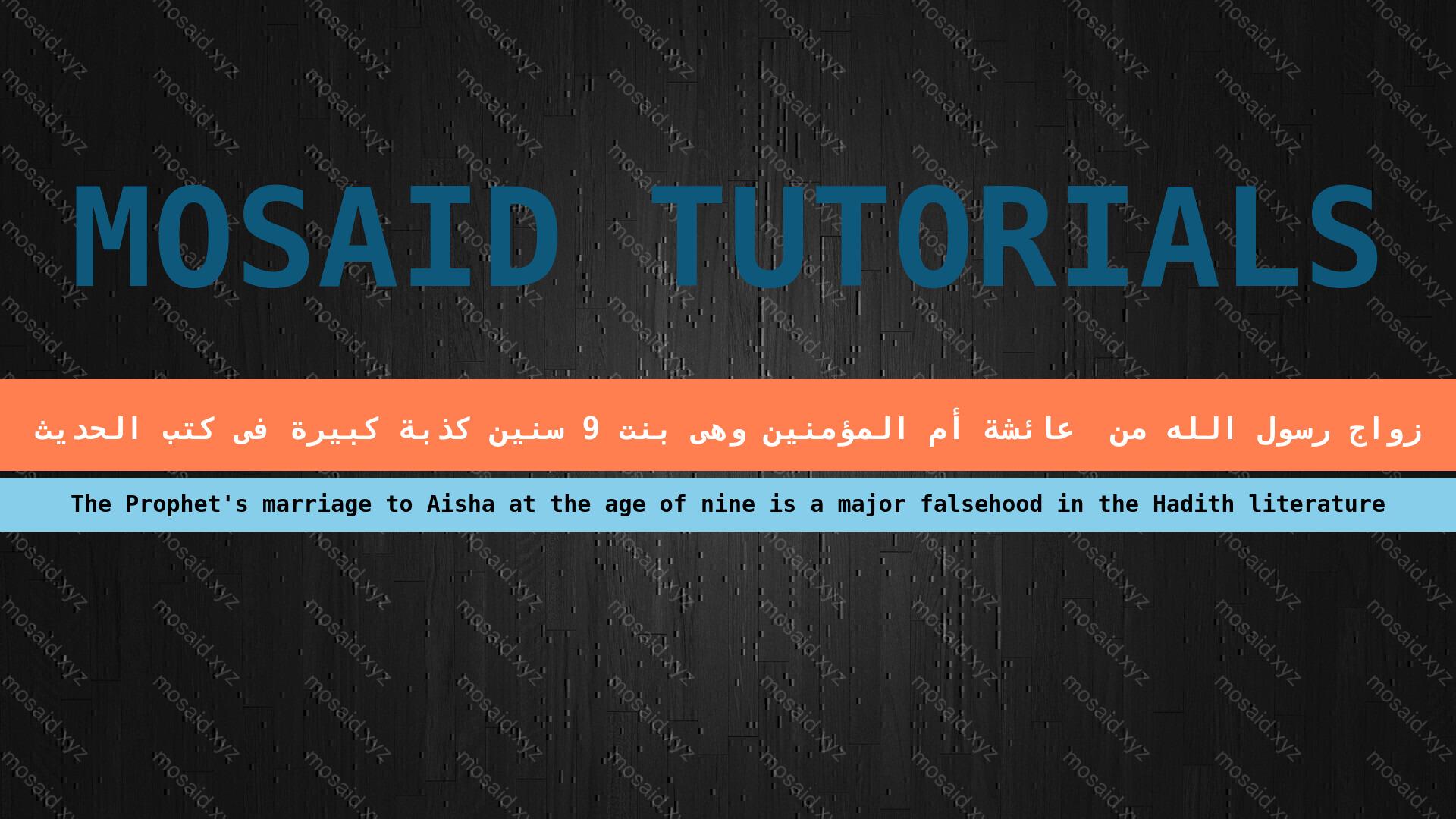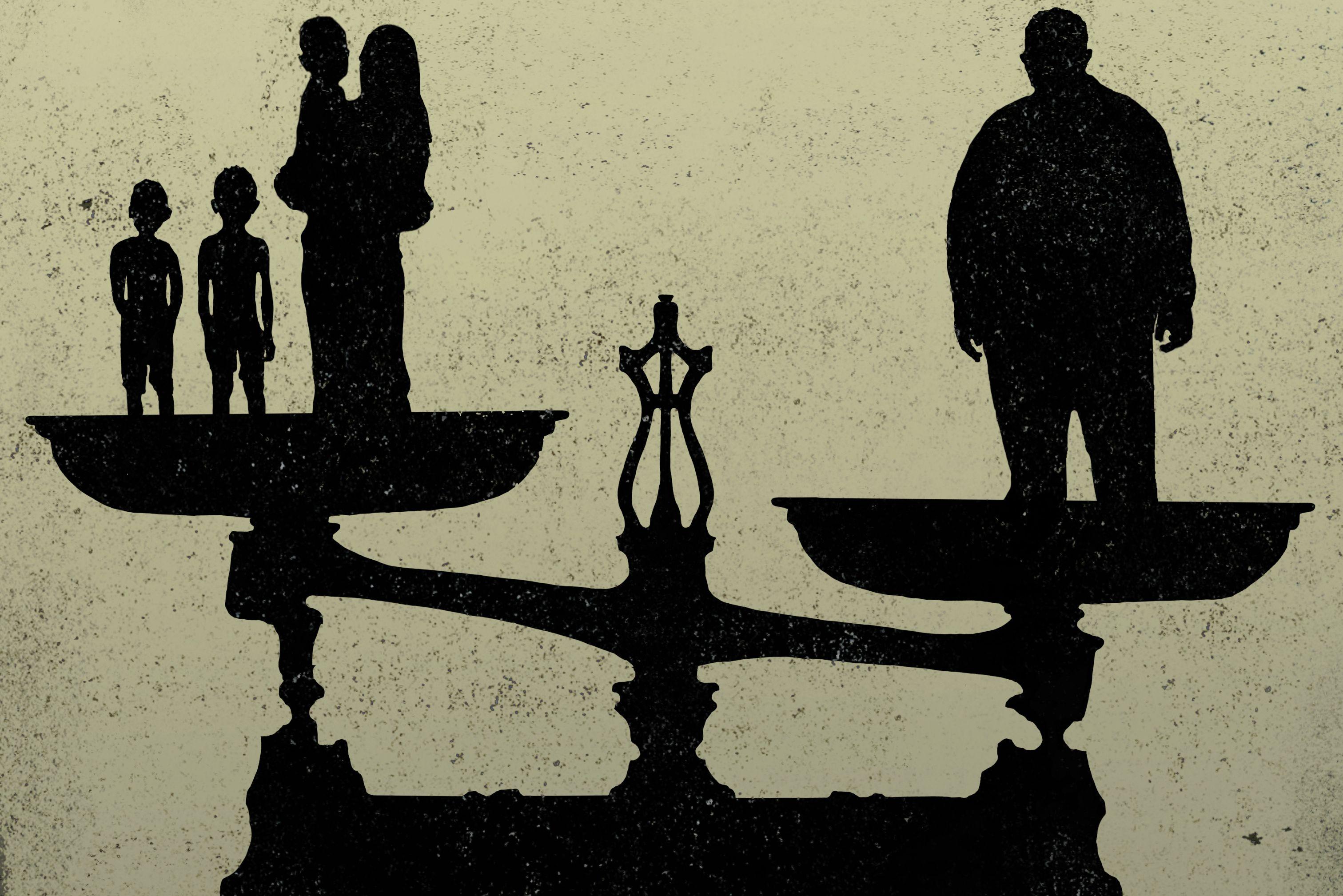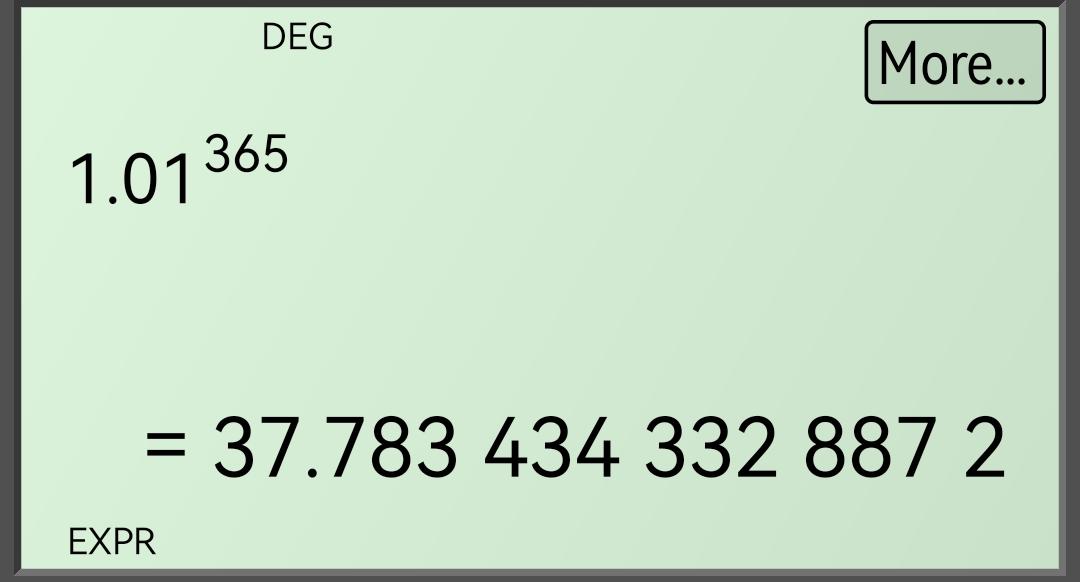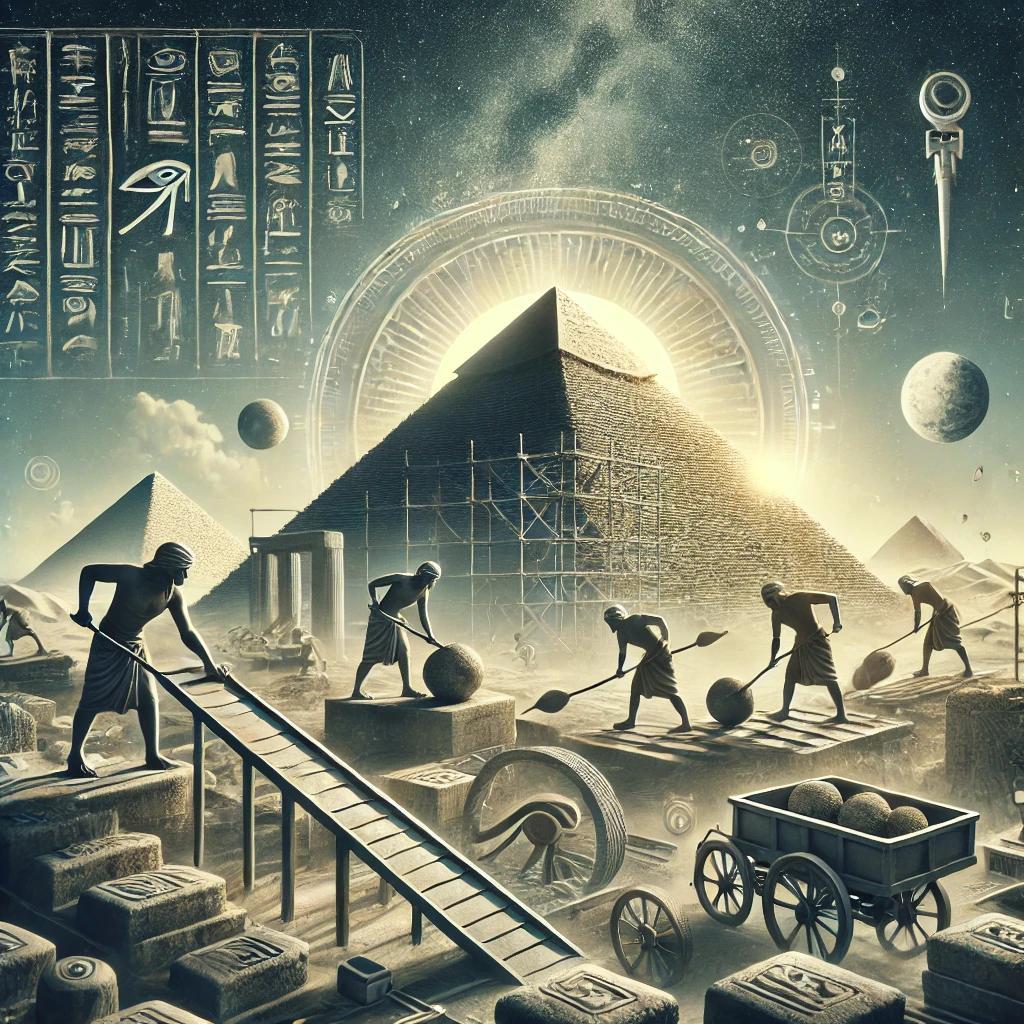Lady Aicha's True Age at Marriage of Prophet Mohamed Peace Be Upon Him
Category: Other.
Date: 2 months ago
Views: 479
You Can Read this Article in Original Arabic يمكنك قراءة هذا المقال بالعربية
The Prophet's marriage to Aisha at the age of nine is a major falsehood in the Hadith literature. Biographical and authoritative Islamic sources refute the narrations of Bukhari, confirming that the daughter of Abu Bakr married the Prophet at the age of eighteen.
When the voices of the wise emerge to defend the Prophet, peace be upon him, confirming through history and authenticated narrations the inaccuracy of many of the narrations that some attribute to Islam, such as the narration of the Prophet's marriage, peace be upon him, to Lady Aisha when she was nine years old, they face that sacred obstacle which asserts the sanctity of ancient jurisprudential methodologies, the books of Bukhari and Muslim, sanctifying them from error, and rejecting any attempt to exert independent reasoning in correcting their narrations even if they are doubtful. For they are the sciences ahead of their time, unaccepting of renewal, addition, deletion, revision, commentary, or even criticism.
It is the same with the widely circulated narration known by almost every Muslim, found in Bukhari and Muslim, stating that the Prophet (peace be upon him), at the age of fifty, married the Mother of the Believers (Aisha) when she was six years old, consummating the marriage when she was almost nine. This narration, which gained the famous seal of immunity merely by its mention in Bukhari and Muslim, despite contradicting everything conceivable, contradicts the Quran, authentic Sunnah, reason, logic, custom, and the chronological sequence of events in the prophetic mission. The narration documented by Bukhari comes through five chains of transmission with one meaning for the text, and due to the length of the narration, we will mention its initial and final parts conveying the intended meaning (Bukhari - Chapter of the Prophet's Marriage to Aisha and Her Arrival in Medina and His Consummation with Her - 3894): Frooq ibn Abi al-Mughirah narrated to us: Ali ibn Mas'har narrated to us, from Hisham, from his father, from Aisha, may Allah be pleased with her, she said: "The Prophet married me when I was six years old, and we came to Medina... He consummated the marriage with me when I was nine years old."
Relying on the foundational texts of history and the authenticated biographies of the prophetic mission (such as al-Kamil, History of Damascus, Lives of the Nobles, History of al-Tabari, Al-Bidaya wa'l-Nihaya, History of Baghdad, and many others), they are almost unanimous regarding the chronological timeline of the events of the prophetic mission as follows:
- The Prophetic mission lasted for 13 years in Makkah.
- It continued for 10 years in Madinah.
- The Prophetic mission began in the year 610 CE (according to the Gregorian calendar).
- The migration (Hijrah) to Madinah occurred in the year 623 CE, which is 13 years after the start of the mission in Makkah.
- The Prophet passed away in the year 633 CE, which is 10 years after the migration to Madinah.
According to this agreed-upon timeline, it is assumed that the Prophet married Aisha three years before the Hijra to Medina, i.e., in the year 620 CE. This corresponds to the tenth year of revelation, and (According to Sahih Bukhari) Aisha was six years old at the time. He consummated the marriage with her at the end of the first year of migration, i.e., at the end of the year 623 CE, when she was nine years old. According to the Gregorian calendar, this means she was born in the year 614 CE, which corresponds to the fourth year of revelation according to Bukhari's narration.
This is a misconception and a significant error, as we will see in detail in this article.
Historical critique of the narration:
1. Calculating the age of Lady Aisha in relation to her sister, Asma bint Abi Bakr
All the aforementioned historical sources unanimously assert that Asma was ten years older than Aisha. These sources also agree that Asma was born 27 years before the Hijra to Medina, meaning she was 14 years old at the beginning of the prophetic mission in Mecca in 610 CE, deduced by subtracting her age before the migration (13 years of the prophetic call in Mecca) from her total age (27 - 13 = 14 years). All sources confirm that she was ten years older than Aisha, confirming that Aisha was four years old at the start of the prophetic mission in Mecca, meaning she was born in 606 CE. When the Prophet married her in Mecca in the tenth year of the prophetic mission, she was 14 years old (4 + 10 = 14 years). In other words, Aisha was born in 606 CE, and the Prophet married her in 620 CE when she was 14 years old. He consummated the marriage with her after three years and a few months, at the end of the first year of migration and the beginning of the second year, in 624 CE, making her age at that time 18 years (14 + 3 + 1 = 18 years), which is the actual age at which the noble Prophet married Aisha.
2. Calculating Aisha's age in relation to the death of her sister, Asma:
The aforementioned historical sources unanimously confirm that Asma died after a well-documented and established incident, the killing of her son, Abdullah ibn al-Zubayr, by the infamous tyrant, al-Hajjaj, in 73 AH. At the time of her death, Asma was 100 years old. If we subtract Asma's age at the time of her death (73 AH), when she was 100 years old, we get 27 years, which is her age at the time of the Prophet's migration, aligning perfectly with the age mentioned in historical sources. Subtracting the ten years by which Asma was older than Aisha, Aisha's age at the time of migration would be 17 years (27 - 10 = 17 years). If we consider the Prophet consummated the marriage with her at the end of the first year of migration, her age at that time would be 18 years (17 + 1 = 18 years), confirming the correct calculation of Lady Aisha's age at the time of her marriage to the Prophet. Additionally, Tabari asserts with certainty in his book "History of Nations" that all the children of Abu Bakr were born in the pre-Islamic era, which aligns with the correct timeline and exposes the weakness of Bukhari's narration, as Aisha was indeed born in the fourth year before the start of the prophetic mission.
3. Calculating Aisha's age compared to Fatimah al-Zahra, the daughter of the Prophet:
Ibn Hajar mentions in "al-Isabah" that Fatimah was born during the construction of the Kaaba when the Prophet was 35 years old. According to this narration by Ibn Hajar, though it's not considered strong, assuming its strength, Ibn Hajar, who is a commentator on Bukhari, indirectly refutes a narration within Bukhari. If Fatimah was born when the Prophet was 35 years old, then Aisha was born when the Prophet was 40 years old, which corresponds to the beginning of his prophethood. This means that Aisha's age at the time of migration was equivalent to the number of years of Islamic preaching in Mecca, which is 13 years, not 9 years. This narration is mentioned here only to illustrate the significant discrepancy in Bukhari's narration.
Critique of the narration from Hadith and Seerah books:
1. Ibn Kathir mentions in "Al-Bidaya wal-Nihaya" regarding those who embraced Islam early: "Among the women... Asma bint Abi Bakr and Aisha. Aisha was young, and these individuals embraced Islam within three years. The Messenger of Allah (peace be upon him) called secretly, and then Allah, the Almighty, commanded His Messenger to openly proclaim the call." Of course, this narration indicates that Aisha accepted Islam before the Prophet publicly announced his mission in the fourth year of prophethood, which corresponds to the year 614 CE. This means that she believed at least in the third year, which is equivalent to 613 CE. If we consider the narration from Al-Bukhari that Aisha was born in the fourth year of revelation, it implies that she was not present on Earth when the Prophet openly called to Islam in the fourth year of his mission. Alternatively, she would have been an infant. However, a proper calculation of her age confirms that she was born in the year 606 CE, which means that she was eight years old when the Prophet publicly called to Islam in 614 CE. This aligns with the correct timeline of events and contradicts the narration in Al-Bukhari.
2. Imam al-Bukhari himself narrates in the chapter "The Residence of Abu Bakr during the Time of the Prophet" that Aisha said: "I have never seen my parents embracing Islam except that they were already Muslims, and not a day passed except that the Messenger of Allah would come to our house both in the morning and in the evening. When the Muslims faced persecution, Abu Bakr migrated towards Abyssinia." I do not understand how al-Bukhari includes this narration because Aisha mentions that her parents embraced Islam before the migration to Abyssinia, as she stated. She also mentions that the Prophet used to visit their house every day, indicating that she was aware of these visits. It is universally agreed by historical sources that the migration to Abyssinia occurred in the fifth year of the prophetic mission, which corresponds to approximately 615 CE. If we assume the truth of Bukhari's narration that Aisha was born in the fourth year of the prophetic mission, which is 614 CE, it would mean that she was an infant during the migration to Abyssinia. How does this align with the statement "I have never seen my parents embracing Islam" when the word "seen" doesn't require clarification? However, according to the correct chronological timeline, Aisha would have been 4 years old before the start of the prophetic mission and 5 years old before the migration to Abyssinia, totaling 9 years, which is her actual age at that time.
3. Imam Ahmad narrates in "Musnad Aisha" that when Khadijah died, Khawlah bint Hakim, the wife of Uthman ibn Maz'un, came to the Prophet and said, "O Messenger of Allah, why don't you marry?" He asked, "Whom?" She replied, "If you wish, a virgin, and if you wish, a previously married woman." He asked, "Who is the virgin?" She said, "The one most beloved to you among Allah's creation, Aisha, the daughter of Abu Bakr." Here, it becomes evident that Khawlah bint Hakim presented both virgin and previously married (divorced or widowed) options to the Prophet. Was she presenting them based on their readiness for marriage, or was one of them a child whom the Prophet should wait to reach marriageable age? The context of the hadith indicates that she presented them as potential immediate spouses, as evidenced by her statement, "If you wish, a virgin, and if you wish, a previously married woman." Therefore, it is implausible that Aisha was a child at that time at the age of six, as presented by Khawlah as a potential marriage candidate ("a virgin").
4. Imam Ahmad also narrates a lengthy hadith from Khawlah bint Hakim about Aisha's engagement to the Prophet. The important part of it is as follows: "Umm Roman said: 'Indeed, Muta'im ibn 'Adi proposed to her for his son, and by Allah, Abu Bakr never promised something without fulfilling it... Perhaps you (the Prophet) will be his successor." The meaning here is simply that Muta'im ibn 'Adi, who was a disbeliever, had proposed to Aisha for his son Jabir ibn Muta'im before the noble Prophet. Abu Bakr wanted to fulfill his promise, so he visited him and found him saying, "Perhaps if I marry my son to Aisha, he will become a follower of your religion." Here, we pause with very important conclusions: Aisha could not have been engaged before the age of 6 to an older man who fought against the Muslims in Badr and Uhud, wanting to marry someone like Jabir. Also, it is impossible for Abu Bakr to have betrothed his daughter to one of the polytheists who were persecuting the Muslims in Mecca. This indicates that this was a promise of engagement made before the start of the prophetic mission when both parties were young, confirming that Aisha was indeed born before the start of the prophetic mission.
5. Al-Bukhari narrates in the chapter "The Statement of Allah: 'The Hour has drawn near, and the moon has split'": Aisha said, "Indeed, this verse was revealed to Muhammad [in Mecca], and I was a young girl playing, 'The Hour has drawn near, and the moon has split.'" It is universally agreed that Surah Al-Qamar was revealed four years after the start of the revelation, around 614 CE. If we believe Bukhari's narration, Aisha either had not been born yet or was a newborn baby when the Surah was revealed. However, Aisha says, "I was a young girl playing," indicating that she was a child playing. How could she not have been born yet? But the timeline consistent with the events confirms that she was 4 years old at the start of the revelation and 8 years old when the Surah was revealed, as we have repeatedly explained, which aligns with her statement "I was a young girl playing."
6. Al-Bukhari narrates in the chapter "A Virgin should not be married without her consent": The Messenger of Allah said, "A virgin should not be married until her permission is sought." They said, "O Messenger of Allah, how can her permission be sought?" He said, "By her silence." How can the noble Prophet say this and then act contrary to it? The hadith reported by Al-Bukhari from the age of the Mother of the Believers at her marriage attributes to her the statement that she used to play with dolls and that no one asked her permission for her marriage to the Prophet. How could she be asked while she was a very young child who did not understand the meaning of marriage? Even her consent at this age does not have any legal effect because it is consent given without being legally responsible, mature, or rational.
Critique of the Isnad (chain of narrators):
I will focus here on explaining the weaknesses in the chain of narrators in Al-Bukhari's narration only:
The hadith that mentioned the age of the Mother of the Believers came through five chains:
1.• Furwah ibn Abi al-Mughirah told us: Ali ibn Mas'har narrated to us, from Hisham, from his father, from Aisha.
2.• Ubaid ibn Isma'il told us: Abu Usamah narrated to us, from Hisham, from his father.
3.• Mua'la ibn Asad told us: Wahb narrated to us, from Hisham ibn Urwah, from Aisha.
4.• Muhammad ibn Yusuf told us: Sufyan narrated to us, from Hisham, from his father, from Aisha.
5.• Qubaysah ibn 'Uqbah told us: Sufyan narrated to us, from Hisham ibn Urwah, from Urwah.
And as we see, all the narrations trace back to one narrator, which is Urwah. He is the one who exclusively narrated from Aisha, and his son Hisham narrated exclusively from him. The problem lies in Hisham, as Ibn Hajar mentioned in "Hady al-Sari" and "Tahdhib," stating, "Abd al-Rahman ibn Yusuf ibn Kharash said: Malik did not approve of him. It reached me that Malik held a grudge against him for his narrations to the people of Iraq. He came to Kufa three times. The first time he used to say: 'My father told me, I heard Aisha.' The second time he used to say: 'My father informed me about Aisha.' The third time he used to say: 'My father about Aisha.'"
In simple terms, Hisham ibn Urwah was considered trustworthy in Al-Madinah. However, when he went to Iraq, his memory for Hadith deteriorated. He began fabricating or attributing Hadith to other narrators. Then he started saying "from my father" instead of "I heard" or "he told me." In the science of Hadith, the phrase "I heard" or "he told me" is stronger than "from so-and-so." The Hadith in Bukhari is reported as "Hisham from his father," not "I heard" or "he told me," which raises doubts about the authenticity of the chain. Furthermore, Imam Malik said that Hisham's narrations from Iraq are not accepted. Applying this to the Hadith reported by Al-Bukhari, we find it to be substantiated. None of the narrators were from Al-Madinah; they were all Iraqis, indicating that Hisham ibn Urwah narrated it in Iraq. It's implausible for Hisham to spend a long time in Al-Madinah without mentioning a Hadith like this even once. Therefore, we find no mention of Aisha's age at the time of her marriage to the Prophet in Imam Malik's book "Al-Muwatta," as he directly saw and heard Hisham ibn Urwah in Al-Madinah. These two reasons are sufficient to cast doubt on the authenticity of the narration in Bukhari, especially considering the confirmed corruption of its text through historical comparison.
As for the reliance of jurists and scholars, including Al-Bukhari, on this Hadith regarding the marriage of young girls, it represents a dark page in our heritage. We will postpone discussing it for now. It's strange to find Wahhabis promoting the idea that hot climates cause girls to mature early when the Arabian Peninsula, despite being hot, has only gotten hotter. Why then don't we find girls reaching puberty prematurely at six or even nine? This notion contradicts scientific facts, which affirm that climate plays no role in early puberty.
In conclusion, Lady Aisha married the Prophet at the age of 18, not 9, based on accurate estimation. This narration reported by Al-Bukhari is simply corrupt in its text and doubtful in its chain of transmission, as it contradicts Sharia, reason, authentic Hadiths, societal norms, and customs. Moreover, it extremely contradicts the timeline of the events of the Prophet's mission. We shouldn't hold Al-Bukhari and other scholars in higher regard than the Prophet himself. We are free to accept or reject what they have reported. Islam is not confined to the scholars and their time alone. Therefore, we can freely critique and reject much of what is contained in their books—these texts are ultimately human heritage, not divine scripture, and should never be sanctified or deified. We and the scholars of the past are - as humans- on equal footing, none of us superior to the other. They are just as prone to errors as they are capable of making accurate judgments.





















0 Comments, latest
No comments.